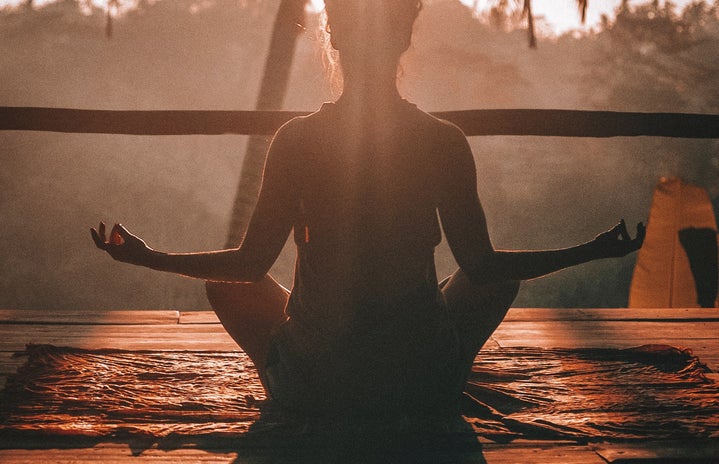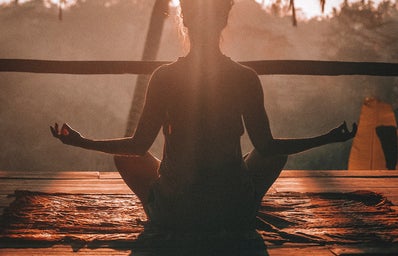Meditation is by no means a modern technique or tradition. While its origins are debated, the earliest records of meditation as a practice date from approximately 1500 years BCE. Meditation was an undoubtedly vital part of the earliest forms of Vedic (Hindu) schools in India, and forms of meditation were practiced as far back as the 3rd and 6th century BCE by Chinese Buddhists and Daoists. Eventually, most religions began to incorporate some form of meditation into their religious tradition (i.e. prayer), which introduced meditation to Western cultures. It wasn’t until the 18th century, though, that meditation began to grow in popularity amongst Western audiences. Today, most people I know seem to be at least generally familiar with meditation as a concept.
I, personally, have known about meditation for as long as I can remember. My mom, a self-proclaimed holistic health aficionado, would have me join her in meditation every week when I was little. Though, I, of course, had a limited understanding of meditation at that age. As I got older and busier, I abandoned meditation. Consequently, I never truly got to experience the benefits of meditation that, for example, my mom did. Throughout high school, I became more aware of my struggles with anxiety and various doctors and counselors recommended I try meditation for stress/general anxiety management. Overall, meditation has always been an activity I wanted to “get (back) into,” but for some reason or another, I never could actually make myself commit to it… that was, until recently.
On a particularly stressful day a couple of weeks ago, I randomly remembered that Notre Dame had partnered with the Calm app (apparently the #1 app for sleep and meditation) this last year to offer students free premium subscriptions. I had downloaded Calm in pre-pandemic times, but the subscription cost felt a bit too high for me to justify keeping it, especially because I was just wanting . For that reason, I was super excited realizing I would finally be able to try it out (and for free)!
The first night I had the app, I completed a “Daily Calm” before I went to sleep. At first, I was worried that 10 minutes might feel like a lot or that I might not be able to sit still for that long, but I was pleasantly surprised to discover how easy and intuitive the session felt. By the end of the 10 minutes, I found myself wondering how that much time had already passed. I loved the periodic affirmations and the calmness of the narrator’s voice paired with the equally-soothing background noise. Not only did the session feel super quick, it also left me relaxed and ready for bed.
Since then, I’ve been trying to complete at least one guided meditation session a day. I also have participated in some of the week-long challenges, like “7 days of calming anxiety,” “7 days of focus,” etc., and I can honestly say I feel a real, positive difference in my emotions (or at least how I handle them). Meditation sessions are becoming something I look forward to doing each day. Knowing that I have that designated time each day, even if just 10 minutes, to just be alone, still and present brings me comfort. I will admit that I have forgotten my daily meditation goal a few times (especially on my most hectic days), but with guided meditations as short as 2 minutes, Calm is making meditation more accessible and manageable than I ever knew was possible.

In addition to guided verbal meditations, a Calm subscription offers access to podcast episodes covering a wide range of wellness-related topics, such as inspiration, self-improvement and creativity. You can also follow-along with the app’s guided breathing exercises—and they’re not just for relaxation. The app’s various types of breathing exercises are intended to have different effects depending on the specific technique; for example, box breathing is supposed to help you “sharpen concentration and improve performance,” while deep belly breathing apparently “strengthens the body and restores energy.” Further, I’m also someone who also wants to get into the habit of journaling, and Calm’s check-in feature is helping me achieve that goal. The check-ins ask short, straightforward and digestible questions which makes journaling feel much more effortless and feasible than other methods I have tried in the past.
So, I’m telling you what I have already told all of my friends: if you’re like me and are interested in learning to meditate but don’t know where or how to start, I *highly* recommend you give the Calm app a try (especially if you’re an ND student … because who can say no to free stuff?)!
Follow HCND on Twitter, like us on Facebook, Pin with us and show our Instagram some love!



